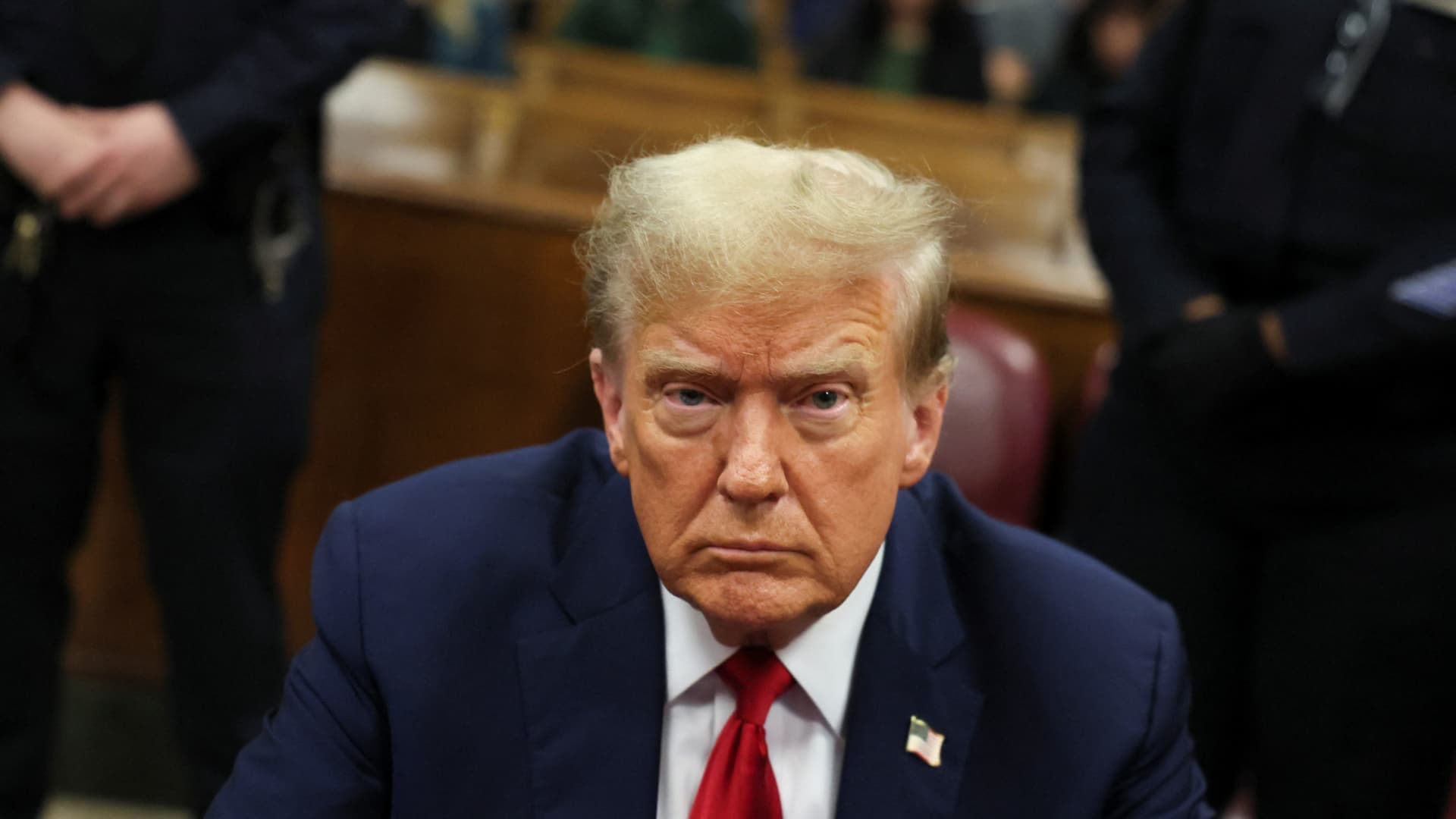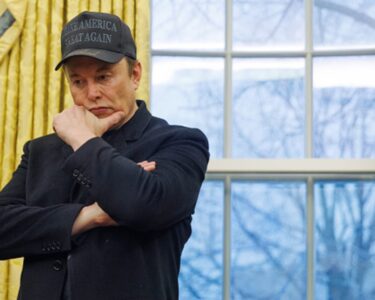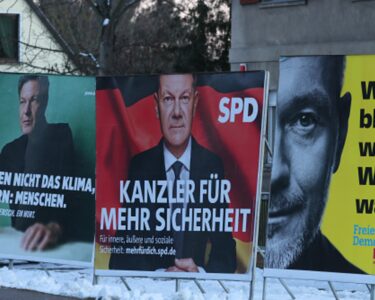Former National Enquirer publisher David Pecker on Tuesday testified in the New York hush money trial of Donald Trump that his outlet would “embellish” negative stories about Trump’s political rivals during the 2016 election.
Trump’s then-attorney Michael Cohen would reach out and request that the tabloid publish an article about one of Trump’s opponents, Pecker testified in Manhattan Supreme Court.
Cohen would send an article about one of those opponents, such as Sen. Ted Cruz, R-Texas, and the Enquirer “would embellish it from there,” Pecker testified.
He added that he understood Cohen to be reaching out on behalf of himself and Trump.
Pecker was a key player in the alleged “catch and kill” scheme to influence the 2016 election by paying hush money to women who claimed they had extramarital affairs with Trump years earlier. Trump faces 34 counts of falsifying business records related to a $130,000 payment to one of those women, porn star Stormy Daniels.
Pecker is the first witness to testify in the historic trial of the presumptive Republican presidential nominee. The trial is set to last six weeks.
Before Pecker returned to the witness stand, Judge Juan Merchan held a hearing on whether the former president should be held in contempt for allegedly violating his gag order 10 times in online posts.
Seven of those posts came during last week’s jury selection process. Most either referenced or linked to articles referencing Cohen, a key witness in the trial.
One of Trump’s posts on Truth Social echoed a claim from Fox News host Jesse Watters that “undercover Liberal Activists” are “lying to the Judge in order to get on the Trump Jury.”
The posts “unquestionably relate to known witnesses and prospective jurors in this criminal trial” in violation of Trump’s gag order, assistant District Attorney Chris Conroy wrote in a court filing Thursday.
During the hearing Tuesday morning, Conroy accused Trump of violating the gag order again on Monday, when he spoke about Cohen outside the courtroom.
State prosecutors will submit a court filing based on latest alleged violation later Tuesday, similar to the ones that triggered the contempt hearing, Conroy said.
“His disobedience of the order is willful. It’s intentional,” Conroy said. “He knows what he’s not allowed to do and he does it anyway.”
Trump’s attorney Todd Blanche countered, “there was absolutely no willful violation of the gag order.”
Blanche noted that Trump’s gag order does not bar him from responding to political attacks. He argued that Trump’s posts were in response to political comments and were not focused on witness testimony.
Trump is trying to carefully comply with the gag order, Blanche said. But Merchan appeared unconvinced.
“Mr. Blanche, you’re losing all credibility with this court,” the judge said.
The prosecutors want Merchan to hold Trump in contempt of court. If that happens, Merchan could technically impose punishments ranging from a small fine, up to 30 days in jail.
Conroy in the hearing said that while the state is not seeking to incarcerate Trump, Merchan should remind him that “incarceration is an option, should it be necessary.”
The judge did not rule during the hearing, which ended shortly before 11 a.m. ET.
Prosecutor Joshua Steinglass initially questioned Pecker about his history with Trump, establishing their extensive business relationship prior to Trump’s 2015 presidential campaign announcement.
Trump’s former reality TV show “The Apprentice” grew his national profile, helping to spur ratings at the National Enquirer, which covered him “religiously,” Pecker said. The two men spoke either monthly or quarterly, said Pecker, who described their relationship as “mutually beneficial.”
Pecker was invited by Cohen to Trump’s June 2015 campaign kickoff at Trump Tower, according to an email shown in court.
Two months later, Pecker attended a meeting with Trump, Cohen and former Trump aide Hope Hicks, who asked the publisher what he could do to help the campaign. Pecker testified that he told the group he would publish positive stories about Trump and negative stories about Trump’s opponents.
He also vowed to be the campaign’s “eyes and ears,” which meant that he would alert Cohen of any negative information about Trump that could come to light.
“I was the person who thought that a lot of women would come out to try to sell their stories because Mr. Trump was well known as the most eligible bachelor. And dated the most beautiful women,” Pecker said.
“And it was clear that based on my past experience that when someone was running for public office like this, it is very common for these women to call up magazines like the National Enquirer to try to sell their stories.”
The arrangement was not put into writing, Pecker testified. “It was just an agreement among friends.”
Pecker later detailed a deal to pay $30,000 to Dino Sajudin, a former Trump Tower doorman who was selling a story that Trump had a child with a maid who worked at the building.
After Dylan Howard, the National Enquirer’s editor in chief at the time, got a tip about the story in October 2015, Pecker testified that he “immediately” called Cohen.
Cohen said the story was “absolutely not true,” but said he would look into it, Pecker testified. Pecker said he instructed Howard to buy the story to have it “removed from the market.” Howard negotiated the $30,000 figure, and Pecker told Cohen that the publisher would pay for it.
It was the first instance of paying a source to bury a story about Trump, Pecker testified.
Pecker and Howard would conclude the story was untrue. But “I made the decision to buy the story because of the potential embarrassment to the campaign and Mr. Trump,” Pecker testified.
On Monday, jurors heard opening statements from the prosecution, which alleged that Trump led a criminal hush money scheme to influence the 2016 presidential election. Opening statements also came from the defense, which denied that Trump had committed any crime.
“It was election fraud, pure and simple,” prosecutor Matthew Colangelo told the jury.
Defense lawyer Todd Blanche fired back, “I have a spoiler alert: There’s nothing wrong with trying to influence an election. It’s called democracy.”
Trump is charged with falsifying business records to discreetly reimburse Cohen, who in late 2016 paid Daniels $130,000 for her silence about an alleged sexual tryst with Trump years earlier.
Manhattan District Attorney Alvin Bragg accuses Trump of carrying out the hush money scheme to influence the 2016 election, which he would go on to win.






